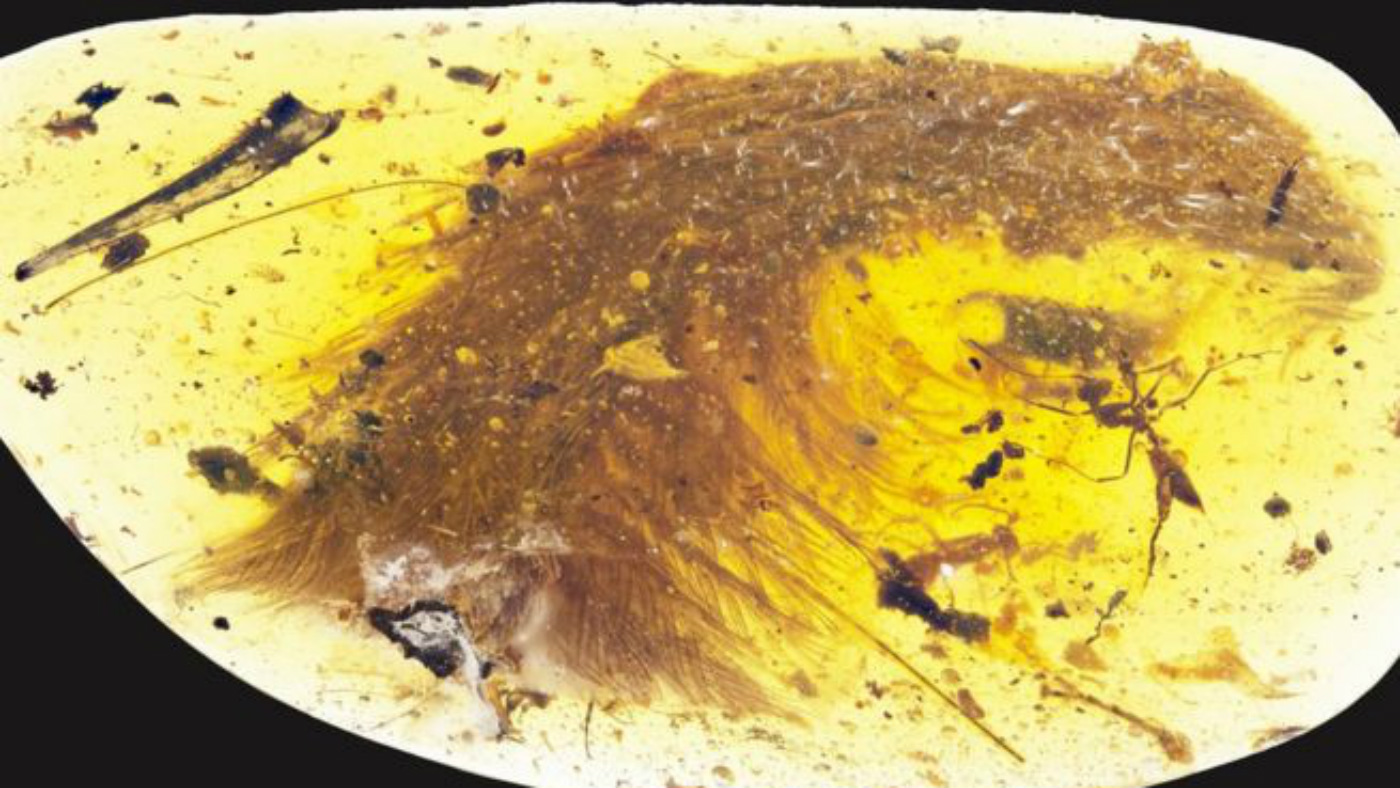Feathered dinosaur tail found preserved in amber
'One-of-a-kind discovery' - bought in a market in Myanmar - offers scientists fresh insight into the evolution of feathers

A free daily email with the biggest news stories of the day – and the best features from TheWeek.com
You are now subscribed
Your newsletter sign-up was successful
Bones and feathers from the tip of a dinosaur tail have been found among fossils for sale in a market in Myanmar, report a team of scientists in Current Biology.
The "one-of-a-kind discovery helps put flesh on the bones of these extinct creatures", says the BBC, and opens a "new window on the biology of a group that dominated Earth for more than 160 million years".
It was uncovered by geoscientist Lida Xing, from the China University of Geosciences in Beijing, who was able to trace its origin by tracking down the amber miner who had dug it out of the earth.
The Week
Escape your echo chamber. Get the facts behind the news, plus analysis from multiple perspectives.

Sign up for The Week's Free Newsletters
From our morning news briefing to a weekly Good News Newsletter, get the best of The Week delivered directly to your inbox.
From our morning news briefing to a weekly Good News Newsletter, get the best of The Week delivered directly to your inbox.
Dr Ryan McKellar, the co-author of the study, said it was "fortunate" Xing was in the marketplace on that particular day.
He said: "It's one of those things where if there hadn't been the right person on the ground at the time, I think it would have disappeared into a private collection or gone entirely unnoticed."
Researchers believe the tail probably belonged to a theropod, a classification that includes the tyrannosaurus.
This example came from a "juvenile coelurosaur, a creature closely related to birds that typically had some kind of feathers", says the Smithsonian Magazine.
A free daily email with the biggest news stories of the day – and the best features from TheWeek.com
National Geographic says it "captures one of the earliest moments of differentiation between the feathers of birds of flight and the feathers of dinosaurs".
For a long time, dinosaurs were thought to be a relative of scaly lizards, reports Quartz, but over the past two decades, researchers have found more and more evidence that many species had feathers or plumage.
McKellar said: "I think at this point the number of specimens we've seen to date point to the fact that most theropod dinosaurs probably had plumage or feathers at some point in their life, [although] may not have been all the way through to adulthood. It's basically one half of the [dinosaur] family tree."
-
 How Democrats are turning DOJ lemons into partisan lemonade
How Democrats are turning DOJ lemons into partisan lemonadeTODAY’S BIG QUESTION As the Trump administration continues to try — and fail — at indicting its political enemies, Democratic lawmakers have begun seizing the moment for themselves
-
 ICE’s new targets post-Minnesota retreat
ICE’s new targets post-Minnesota retreatIn the Spotlight Several cities are reportedly on ICE’s list for immigration crackdowns
-
 ‘Those rights don’t exist to protect criminals’
‘Those rights don’t exist to protect criminals’Instant Opinion Opinion, comment and editorials of the day
-
 Epstein files topple law CEO, roil UK government
Epstein files topple law CEO, roil UK governmentSpeed Read Peter Mandelson, Britain’s former ambassador to the US, is caught up in the scandal
-
 Iran and US prepare to meet after skirmishes
Iran and US prepare to meet after skirmishesSpeed Read The incident comes amid heightened tensions in the Middle East
-
 Israel retrieves final hostage’s body from Gaza
Israel retrieves final hostage’s body from GazaSpeed Read The 24-year-old police officer was killed during the initial Hamas attack
-
 China’s Xi targets top general in growing purge
China’s Xi targets top general in growing purgeSpeed Read Zhang Youxia is being investigated over ‘grave violations’ of the law
-
 Panama and Canada are negotiating over a crucial copper mine
Panama and Canada are negotiating over a crucial copper mineIn the Spotlight Panama is set to make a final decision on the mine this summer
-
 Why Greenland’s natural resources are nearly impossible to mine
Why Greenland’s natural resources are nearly impossible to mineThe Explainer The country’s natural landscape makes the task extremely difficult
-
 Iran cuts internet as protests escalate
Iran cuts internet as protests escalateSpeed Reada Government buildings across the country have been set on fire
-
 US nabs ‘shadow’ tanker claimed by Russia
US nabs ‘shadow’ tanker claimed by RussiaSpeed Read The ship was one of two vessels seized by the US military